In this section: Oran Cohen, Chaeli Mycroft, Marisa Fassler, Judith February, Dirk Herman and more…
Oran Cohen, imagineer
 At 28, the Johannesburg ‘imagineer” has travelled to more countries than many people can name. He exudes entrepreneurial skill and does what makes him happy.
At 28, the Johannesburg ‘imagineer” has travelled to more countries than many people can name. He exudes entrepreneurial skill and does what makes him happy.
Cohen represents South Africa on the World Spirit Youth Council, a United Nations NGO.
He is passionate about peace in Palestine and has worked with the Interfaith Encounter Association in Israel, which brings children of different faiths together.
Cohen works with Geniuslab, which runs workshops to inspire innovation and creativity. He is the founder and creative director of Fizzy, which develops online holistic marketing strategies for companies, and the creator of the Imagineering Academy, which helps to develop problem solving techniques for corporates.
He’s also the vocalist in his self-titled band and is writing an animated feature film. How does he do it? ‘I just believe things don’t have to be so hard,” Cohen says.– Ilham Rawoot
Lunch spot: The Ant, Melville, Johannesburg
Chaeli Mycroft, Co-founder: Chaeli Campaign
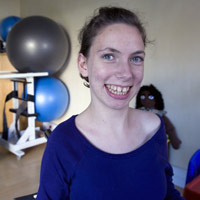 Chaeli Mycroft isn’t sure what to do next. She’s already started up a non-profit, been featured on Carte Blanche and most recently won the Youth Category for the South Africa’s Social Entrepreneur award.
Chaeli Mycroft isn’t sure what to do next. She’s already started up a non-profit, been featured on Carte Blanche and most recently won the Youth Category for the South Africa’s Social Entrepreneur award.
At the age of 10, Mycroft was nominated as a finalist in the Social Welfare category of the Shoprite Checkers / SABC2 Woman of the Year Award — the youngest finalist in the 11-year history of these prestigious awards.
Her non-profit, the Chaeli Campaign, was started up in 2004 by Mycroft, her sister Erin and their three close friends Tarryn, Justine and Chelsea Terry — all of whom were between six and 12 at the time.
The girls started the campaign to raise R20 000 for Mycroft’s motorised wheelchair. Just seven weeks later, they reached their goal. But after they saw how quickly the money rolled in, they decided to keep going and ever since, the Chaeli Campaign has been raising cash for those suffering from physical and mental impairment and doing outreach work in various communities.
‘Our relationship is what makes our story awesome and what makes it work,” says Mycroft, who has cerebral palsy.
The 14-year-old has had a hard time trying to overcome people’s prejudices. She says people treat her differently and it is something that she has just had to get used to. Changing perceptions towards the differently abled can be a challenge, she says, but fortunately she has four fellow activists and growing support from the public.
In March, the Chaeli Campaign was named as winner in the Youth Category in the South African Social Entrepreneurs Awards.
Mycroft says that winning was a great honour and she is grateful for the many doors that have opened for their organisation because of it.
But she’s still not sure which door to enter once school’s out.
‘I have a lot of different ideas, so it’s hard to decide,” Mycroft says. ‘But I’m thinking of journalism, advertising, events or motivational speaking. I haven’t really made up my mind yet.” — Eamon Allan
Lunch spot: Mugg & Bean, anywhere
Marisa Fassler, Economist
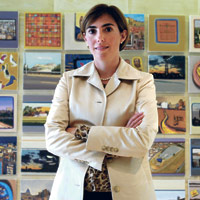 She couldn’t have chosen a career much different from her own mother’s. After studying for an honours in economics at Stellenbosch University, Marisa Fassler — daughter of fashion designer Marianne Fassler — read for an MPhil in development studies at Oxford. Although banking was not her first career choice, she worked for HSBC, ABN Amro Bank and JPMorgan Chase, where she was a senior South Africa economist.
She couldn’t have chosen a career much different from her own mother’s. After studying for an honours in economics at Stellenbosch University, Marisa Fassler — daughter of fashion designer Marianne Fassler — read for an MPhil in development studies at Oxford. Although banking was not her first career choice, she worked for HSBC, ABN Amro Bank and JPMorgan Chase, where she was a senior South Africa economist.
Since then, she’s made the top three in Reuters’ Economist of the Year competition three years running and won the award in 2006. Fassler then moved from the private sector to her current post as chief director of macroeconomic policy in the national treasury’s economic policy unit. She says she’s wanted to work for treasury since she graduated from Oxford. ‘It’s important that there’s a growing pool of skilled technicians giving advice to policymakers,” says Fassler. — Faranaaz Parker
Lunch spot: The Service Station, Melville, Johannesburg
Judith February, manager: Institute for Democracy in South Africa
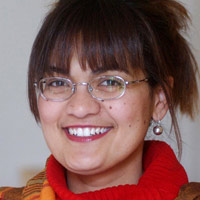 Judith February has been working at the Institute for Democracy in South Africa (Idasa) since June 2000, where she is the manager of the governance unit in the Political Information and Monitoring Service.
Judith February has been working at the Institute for Democracy in South Africa (Idasa) since June 2000, where she is the manager of the governance unit in the Political Information and Monitoring Service.
The unit is tasked with monitoring performance of South Africa’s political institutions, with a focus on government, including corruption and its impact on governance, parliamentary oversight, constitutional law monitoring and institutional design.
Members of the unit, including February, also write general political analysis for a number of publications.
February does consultative work for a New York-based group as part of the stability index on 25 developing countries and she is a member of the Council for Higher Education task team on academic freedom. She sits on the boards of the Goedgedacht Forum for Social Reflection and the Parliamentary Monitoring Group. — Eamon Allan
Lunch spot: 2Go, Tokora, Stellenbosch
>Dirk Herman, deputy general secretary: Solidarity
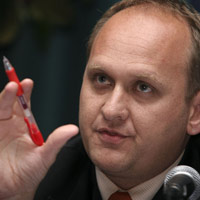 Dirk Herman is the deputy general secretary of South Africa’s largest independent trade union, Solidarity. A largely white, Afrikaans trade union, Solidarity has its roots in the Transvaal Miner’s Association, which formed over 100 years ago and later became the South African Mineworkers Union (MWU).
Dirk Herman is the deputy general secretary of South Africa’s largest independent trade union, Solidarity. A largely white, Afrikaans trade union, Solidarity has its roots in the Transvaal Miner’s Association, which formed over 100 years ago and later became the South African Mineworkers Union (MWU).
Herman joined Solidarity in the late 1990s as a sector organiser. Having done his doctoral thesis on the influence of affirmative action on the alienation of the non-designated group in South Africa, Herman is a vocal critic of the ANC government’s affirmative action policies, particularly in the face of South Africa’s ballooning skills shortage.
He has written three books, the most recent of which, The Naked Emperor: Why Affirmative Action has Failed, was published in 2007. Born and raised in Heilbron in the Free State, Herman studied law at Potchefstroom University, now called North West University. — Eamon Allan
Lunch spot: Die Werf, Pretoria
Judith Mtsewu, manager: Southern Africa Gender Protocol Alliance, Gender Links
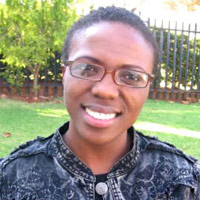 A passionate human rights activist, Judith Mtsewu’s work in civil society aims to give a voice to the marginalised, particularly women and children. She is especially interested in the country’s response to the care work and gender aspects of HIV/Aids. Nearing the completion of her master’s in public policy management at the University of the Witwatersrand, Mtsewu works for Gender Links.
A passionate human rights activist, Judith Mtsewu’s work in civil society aims to give a voice to the marginalised, particularly women and children. She is especially interested in the country’s response to the care work and gender aspects of HIV/Aids. Nearing the completion of her master’s in public policy management at the University of the Witwatersrand, Mtsewu works for Gender Links.
Prior to this she was project coordinator of the Empowering Children and Media programme at the Media Monitoring Project. There she developed the university accredited ‘Reporting on Children” course in partnership with the Wits School of Journalism, aimed at sensitising and training journalists on how to better cover children and child’s rights issues. — Lynley Donnelly
Lunch spot: Soi, Melville, Johannesburg
Doron Isaacs, co-founder and organiser: Equal Education
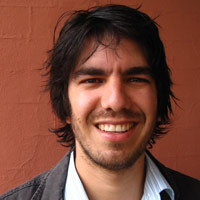 Doron Isaacs has been a busy man. This 28-year-old holds both a business science degree and an LLB from the University of Cape Town and spent much of his time at varsity as an activist and working in student and civil society organisations. He has been general secretary of the Jewish youth movement, Habonim; an organiser at the Treatment Action Campaign; and co-founder of Students for Law and Social Justice — one of the largest student organisations in the country.
Doron Isaacs has been a busy man. This 28-year-old holds both a business science degree and an LLB from the University of Cape Town and spent much of his time at varsity as an activist and working in student and civil society organisations. He has been general secretary of the Jewish youth movement, Habonim; an organiser at the Treatment Action Campaign; and co-founder of Students for Law and Social Justice — one of the largest student organisations in the country.
Last year, Isaacs was one of the people who planned a delegation of South African human rights leaders — such as Barbara Hogan and Nozizwe Madlala Routlegde — to Israel and the occupied Palestinian Territories, to draw attention to the work of Israeli and Palestinian activists.
Equal Education, Isaac’s current project, is a Khayelitsha-based social movement that aims to better South African education, through research, media, law and grassroots activism. — Ilham Rawoot
Lunch spot: Frangipanis, Woodstock, Cape Town
>Daksha Gaman Kassan, activist
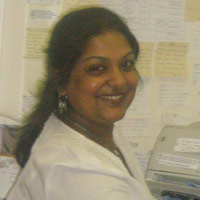 With aspirations of becoming a top-notch lawyer in a high-profile firm, Daksha Gaman Kassan’s career took a drastic turn after working for the Truth and Reconciliation Commission.
With aspirations of becoming a top-notch lawyer in a high-profile firm, Daksha Gaman Kassan’s career took a drastic turn after working for the Truth and Reconciliation Commission.
Now she’s the project coordinator of the Children’s Rights Project at the Community Law Centre at the University of the Western Cape. So instead of backing big money corporate clients, Kassan now fights for child justice and the rights of children across South Africa. With her LLM (cum laude), she is also an admitted attorney of the High Court of South Africa. — Liesl Venter
Lunch spot: Nando’s, Nando’s and more Nando’s
Zunaid Khan, founder: Urban Walkabout
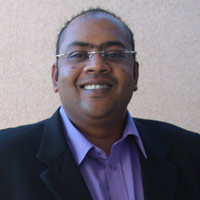 So you thought you knew the city? Well, nobody’s really seen Joburg unless they’ve been on Zunaid Khan’s Urban Walkabout tour. It’s a favourite on the international NGO circuit and takes people walking through the heart of Hillbrow as well as the manicured concrete of Melrose Arch to display the city’s diversity, its history, its people and its politics, all the while revealing how Joburg has taken — and is taking — shape.
So you thought you knew the city? Well, nobody’s really seen Joburg unless they’ve been on Zunaid Khan’s Urban Walkabout tour. It’s a favourite on the international NGO circuit and takes people walking through the heart of Hillbrow as well as the manicured concrete of Melrose Arch to display the city’s diversity, its history, its people and its politics, all the while revealing how Joburg has taken — and is taking — shape.
The city planner who trained at Wits first took to the streets with one of his lecturers who made it part of the curriculum to see the city from the pavement up. Khan got so into it that he started taking visiting urban planning students through different neighbourhoods on weekends as a hobby.
Now his hobby is his business — at least one of them. The 31-year old also owns a Primi Piatti and a bustling little town planning operation to boot. — Tanya Pampalone
Lunch spot: Primi Piatti, Melrose Arch, Johannesburg
Thami Floyd Nkosi, activist
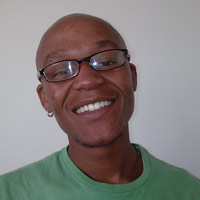 Thami Nkosi says his path to activism was prompted by feelings of hopelessness. After reuniting with his father in 1998, he lost him to the HIV/Aids epidemic just a few months later.
Thami Nkosi says his path to activism was prompted by feelings of hopelessness. After reuniting with his father in 1998, he lost him to the HIV/Aids epidemic just a few months later.
‘I wanted to care for him but couldn’t, because [as a boy] I wasn’t taught how to,” he says. Since then, Nkosi has joined forces with other men to build a society free of HIV/Aids — and free of gender stereotyping. The last two years have seen him actively involved in national, regional and international advocacy work, particularly for sexual and reproductive health rights.
In 2008, he was part of South Africa’s youth team at the third Africa Conference on Sexual Health and Rights. He was also a panellist at the 53rd Commission on the Status of Women session, held at the United Nations in New York. — Karabo Keepile
Lunch spot: Primmi Piatti, anywhere